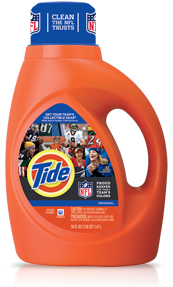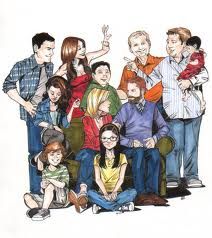
Marriage
How A Laundry Detergent Commercial Saved the World
Daddy, Dirty Laundry and The Princess Syndrome
Posted February 2, 2013
Eating lunch in front of the TV today, I saw a Tide laundry detergent commercial, one that I had never seen before. A male voice described how his little daughter, shown playing in the yard, loved her princess costume. She joyfully wore it whenever it wasn’t in the laundry, he noted. 

Eating lunch in front of the TV today, I saw a Tide laundry detergent commercial, one that I had never seen before. A male voice described how his little daughter, shown playing in the yard, loved her princess costume. She joyfully wore it whenever it wasn’t in the laundry, he noted.
Cute but so what, I thought, just another female child depicted as having bought into The Princess Syndrome – thank you Disney for your never-ending animation-spawned fairytale role models. Girls are such easy pickings. Is there a princess gene for females to go with the one for Häagen-Dazs?
Boys, confronted by this traditional surfeit of Princesses who must be rescued by heroic Princes, never got the message. They did not catch the Prince Charming fever. Halloween surveys of most popular costume sales and rentals prove one thing-- lots of princesses, very few princes.
But as I watched the Tide commercial, what unfolded caught me off-guard. The voice-over male came on screen and said that he knows his daughter loves her costume, she wears it daily, and she spills food on her princess dress when she’s lunching with her close friends, her stuffed animals.
Why does he know this so intimately, you wonder? Because Dad does the laundry. And he knows that Tide yadda, yadda, yadda.
Say what!? The commercial’s story was not about the Little Princess!? It was about Daddy? Holy bait and switch, Batman. The commercial begins with the tired cliché and just as your mind is about to scream STOP with the princesses already -- women just got the right to go into battle and Tide is still commercing in domesticity stereotypes. But BOOM! It turns out Tide is really shooting an RPG at stereotypes of traditional, inept male anti-domesticity.
Most interesting -- nowhere in the commercial is a mommy mentioned or shown. Is this a house husband, a dad with primary custody, a gay father?
Who knows. And that may be the point…or at least part of the point. It doesn’t matter, or at least coming soon to an American mindset, it won’t matter. It won’t matter because the society will have come to accept, embrace, applaud or be blasé about this expansion of the definition of male gender. It will now comfortably include nurturing and domestic sharing -- and eclipse the commercial trope, Dad-the-boob learns from Dr. Mom.
Is there something in the cultural zeitgeist that birthed these Tide commercials? Legalized gay marriage, gay adoptions, jump in house husbands, or is it women as primary or equal wage earners in nuclear families? Maybe all. And the people at Proctor and Gamble are paying attention.
Holy smokes, it could be all the gay couples on TV, especially the gay archetypes Mitchell and Cameron on ABC’s Modern Family, who adopted a daughter and are trying to do it all – for their smart-ass little princess.

Holy smokes, it could be all the gay couples on TV, especially the gay archetypes Mitchell and Cameron on ABC’s Modern Family, who adopted a daughter and are trying to do it all – for their smart-ass little princess.
What I know is, if it’s happening in Tide commercial campaigns, it’s happening, baby. The culture is repositioning. Gender roles are transforming, perhaps even transfiguring. Harry the House Husband, reach back and meet Rosie the Riveter.
I’ll drink to that. Back when I was a single father -- twelve rabbit-hole-years raising my six-year-old daughter -- single fathers who arranged play dates at their homes were UFOs for wary mothers: “Who or what is this guy? I better see for myself. “
I grew weary of greeting suspicious mothers in my motherly apron, the aroma of baking Toll House cookies wafting out of my kitchen, as if to say, Don’t worry, Mom. Your daughter is safe. I’m Harry, the homemaker, not Michael, the molester.
I never imagined that Proctor & Gamble would be one of the good guys. Granted they are not intentionally playing the master sociologist role, they’re just trying to sell their products, but the impact is good.
Just amazing. All this happened in my head because I didn’t fast forward through the commercials of the pre-recorded MSNBC’s Up w/ Chris Hayes. I am enlightened because I put down the remote to eat my bagel.

